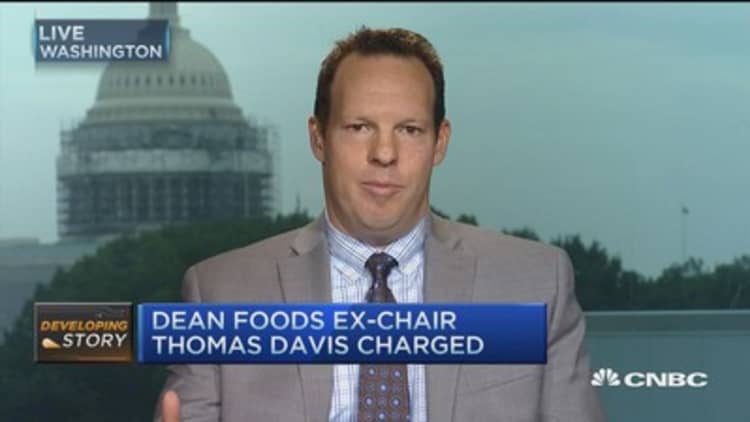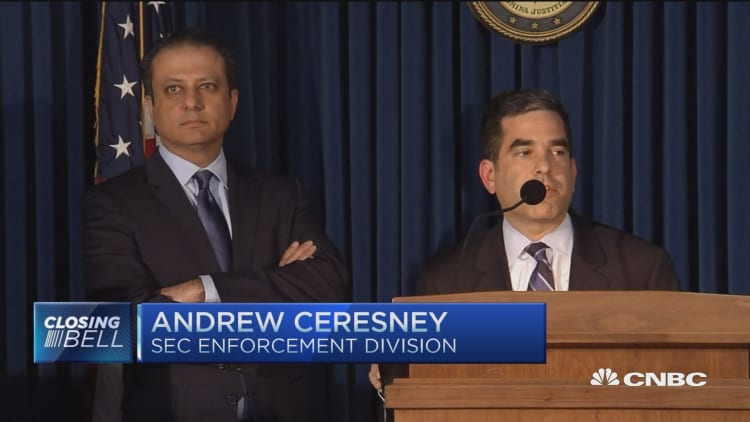


U.S. authorities on Thursday charged a former chairman of Dean Foods and a professional Las Vegas gambler with engaging in a years-long insider trading scheme, which included a tip that benefited professional golfer Phil Mickelson.
William "Billy" Walters, who has built a multimillion-dollar fortune as a famed Las Vegas sports bettor, and Thomas Davis, Dean Food's former chairman, were criminally charged in a case brought by federal prosecutors in Manhattan.
Mickelson, who has won three Masters golf titles, was not criminally charged, but was named as a relief defendant in a civil lawsuit by the U.S. Securities and Exchange Commission, which said he also traded in Dean Foods stock.
A relief defendant is not accused of wrongdoing but has received ill-gotten gains as a result of others' illegal acts.
Walters, 69, was arrested in Las Vegas on Tuesday. Davis, who resigned from Dean Food's board in August, pleaded guilty on Monday.
Both men were charged with securities fraud, wire fraud and conspiracy. Davis was also charged with perjury and obstruction of justice.
Barry Berke, Walters' lawyer, said the allegations were "based on erroneous assumptions, speculative theories and false finger-pointing."
In a statement via his attorney, Mickelson said Thursday he has agreed to return gains he made via trading in Dean Foods stock. He added he felt "vindicated" that he was not charged and took "full responsibility" for becoming part of the probe.
The situation could hit Mickelson's reputation, endorsement deals and future earnings, said Patrick Rishe, director of the sports business program at Washington University in St. Louis.
"Simply put, Mickelson made money that wasn't his to make," Andrew Ceresney, director of the SEC's enforcement division, said Thursday.
Thomas Melsheimer, Davis's lawyer, said his client was "pleased to be cooperating with the government in its investigation."
From 2008 to 2014 Walters obtained inside information from Davis, and used it to make $32 million in profits and avoid another $11 million in trading losses, according to an indictment.
"With a direct channel into Dean Foods' boardroom, Walters placed enormous bets on the company's stock, but as described in the indictment, these bets were no gamble at all: They were a sure thing," Preet Bharara, U.S. attorney in Manhattan, said in a noon news conference. "He had tomorrow's headlines today."
Davis disclosed information to Walters about Dean Foods' financial outlook, earnings, and its spinoff of WhiteWaves Food. The deal sent the company's shares soaring after it was announced on Aug. 8, 2012, according to the indictment.
Walters also obtained insider information about Darden Restaurants from Davis who was sought by an unnamed investment firm in New York as an investor or director, according to the indictment.
The two men have been friends since the mid-1990s, based on shared interests in sports, golf, gambling and business, according to court papers.
The probe conducted by the Federal Bureau of Investigation and U.S. Securities and Exchange Commission became public in 2014 amid news reports also linking the investigation to activist investor Carl Icahn.
Investigators had examined whether Icahn passed inside information about Clorox to Walters, sources have told Reuters. It was unclear if that aspect of the probe remains active.
Icahn acknowledged last year he had a business relationship with Walters but said he never provided inside information to anyone.
The cases in the U.S. District Court, Southern District of New York, are U.S. v. Walters, No. 16-cr-338, U.S. v. Davis, No. 16-cr-338, and Securities and Exchange Commission v. Walters, No. 16-cv-03772.
— CNBC's Jessica Golden, Everett Rosenfeld and Jacob Pramuk contributed to this report.

